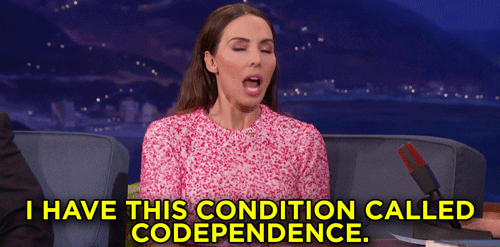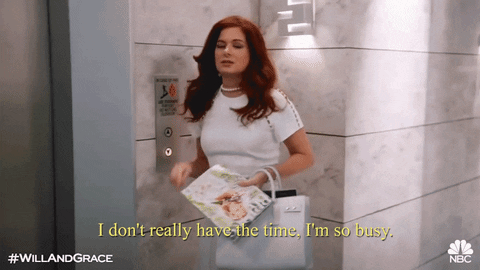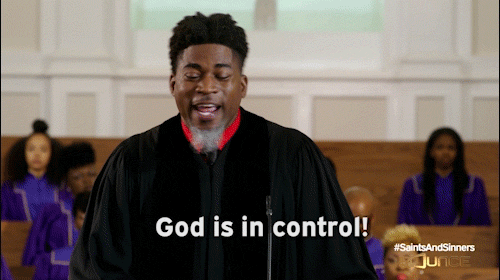It's funny, the things you end up doing that totally mimic your childhood. For instance, right beside me, as I am typing this, there is a big wicker basket that has quite a few books in it. When I was a child, there was something similar in the living room. A book that I always remember being in the pile was Codependent No More: How to Stop Controlling Others and Start Caring for Yourself by Melody Beattie. I also recalled my mother referring to herself, quite often in fact, as being a "codependent in recovery". It's interesting that, even with all of the information that she had on the subject, as a daughter of an alcoholic and mother who, well, was married to one, codependency was something that my mother constantly struggled with—and I think still struggles with. And, because I am the daughter of a codependent, some of the residue of her internal warfare rubbed off on me, although I was well into my thirties before I recognized it.
As women, it is certainly in our nature to be profound and next level nurturers. But when that capability is tainted with childhood trauma (check out "How To Recover If You Had To 'Raise Your Parents' As A Child", "What If It's Your Parents Who Happen To Be The Narcissists?" and "Why You Should Be Unapologetic About Setting Boundaries With Toxic Family Members"), not loving ourselves, never knowing how—and why—to say "no" sometimes, trying to control other people's lives and/or being low-key ego maniacs who think that we know what's better for other people than they do, that can turn us from being blessings to becoming burdens to others and, to ourselves, exhausted, confused and even bitter and resentful as the direct result of always trying to fix everything and everyone.
I know of what I speak because I've been there. More than once. What got me out of being a self-proclaimed Ms. Fix It was 1) asking the five questions that I encourage you to ask yourself and 2) recognizing that a healthy well-being requires a ton of self-awareness, spiritual healing and balance. Pretty much in that order.
Are you ready to stop being Ms. Fix It in your own world? It's my prayer that everything down below can help to get you there.
Ask Yourself, “Am I Codependent?”

I say it often because, for better or worse, the statement applies. For oh so many of us, adulthood is definitely about surviving childhood. One way that a lot of us were affected is growing up in a household where abuse, especially emotional abuse, ran rampant.
Because children are so precious and innocent, we naturally want to please those who are taking care of us. But when they are unhealthy, it teaches us 1) how to take blame for stuff that isn't our fault or our responsibility and 2) to try and make unhappy people happy. And yes, that can start us on the path of being a codependent person which is basically someone who overcompensates in their relationships in order to feel good and worthy.
And that? That is why a lot of adults also end up in codependent relationships and marriages. So, what are the signs that you could possibly be a codependent individual?
- Are you drawn to addicts (of any kind)?
- Do you do things for others that they should be doing for yourself? Hell, do you even know how to determine what those things are?
- Are you consumed with other people's stuff and issues?
- Do you feel responsible for other people's words, actions and choices?
- Do you always make sure that other people's needs are met at the expense of your own?
- Do you minimize how you feel yet resent others for not acknowledging your feelings?
If so, these are some classic signs of being a codependent. Not only that but our fix-it-nature is more about having a low sense of self-worth than actually wanting to help others. It's more about feeling like you won't be loved, appreciated or accepted unless you go out of your way or bend over backwards for someone else. The crazy thing is that, while you're in this head space, while others may be getting their needs and wants met, because you are more invested in their life than your own, your own life will be in shambles. Or worse, you might end up attracting another codependent who will try and…well, fix you.
First Step Solution: If you saw yourself in any of this, first, forgive yourself for not knowing the cycle that you've been in. Then gear up to set up some much-needed boundaries (not walls, boundaries). Articles like "The Relationships In Your Life That Are Desperately In Need Of Boundaries" and books like Safe People: How to Find Relationships That Are Good for You and Avoid Those That Aren't (and if you are married, Boundaries in Marriage: Understanding the Choices That Make or Break Loving Relationships) can help to bring clarity as to why you choose to see people as projects, how to better guard your heart and to strengthen your boundaries so that you can stop being codependent with other individuals.
Then Ask Yourself, “Am I Actually HELPING or Am I ENABLING?”

A lot of things in life have fine lines; especially when we're first learning the differences in them. A great example of this is helping vs. enabling. I have a friend who has a grown daughter who has been taking advantage of her for years. Her daughter is in her thirties at this point but still acts like a 19-year-old as her mom takes care of things that are totally her daughter's responsibility. Whenever my friend and I discuss it, she's always talking about the difference between her daughter's actual age and maturity level. But what seems to continually be my friend's blind spot is her not wanting to accept that her still treating her daughter like she's a teenager is a part of what's preventing her daughter from actually growing up. My friend thinks she is helping her grown child; actually, what she's doing is enabling her.
Good help? That is when it is actually benefiting someone and helping them to grow, evolve and progress as an individual. Enabling someone is all about ignoring toxic patterns, financially compensating for their bad decisions, constantly making excuses for destructive (or counterproductive) behavior and taking on someone else's responsibilities. If you are out here doing more of the latter than the former, you're not fixing anything. You're simply being used and drained of your resources as you play a significant role in keeping someone stagnant.
First Step Solution: Before you agree to do anything for someone, step back and contemplate if you are actually going to help them by doing so. An article that I once read on helping vs. enabling broke the differences down this way—helping is doing something for someone that they are unable to do on their own. Enabling is doing something for someone who is capable of doing it themselves. Knowing the difference makes all the difference. A woman by the name of Darlene Lancer once said, "Allowing others to suffer the consequences of their own actions, without enabling them, is the best motivation for them to undertake the difficult task of change." There is a lot of truth in that. Plenty, in fact.
Also Ask Yourself, “Am I Afraid That ‘No’ Comes with Consequences?”

Ain't it a trip how, a lot of the people who we are afraid to say "no" to, they typically have absolutely no problem saying "no" to us? It could be because they have good boundaries. It also could be because they are self-centered as hell. Either way, the point still stands.
For a lot of us who are constantly trying to fix everything and everyone, sometimes the motive is rooted in fear; fear that if we don't do what's expected of us, we will be rejected or someone won't like or love us anymore. Or, for the super codependents out there, scared that they will no longer be needed. First of all, anyone who is only in your life for what you can do for them, they don't belong there. Second, healthy and mature people get that making a request does not automatically garner the response that they want to hear. In other words, they are fully aware of the fact that, just because they asked for something, that doesn't mean they will—or should—get it. And third, again, balance is important. "No" is a complete sentence (as author Anne Lamott once said), but it's not a full response to an entire relationship. What I mean by that is, don't assume that just because you say "no" to something that others can't handle it. The right ones for you will be fine. The wrong ones? Well, it's time for them to do some shifting in your world, anyway. How they handled your "no" proves it.
First Step Solution: Practice saying "no" to anything that you aren't ready or prepared to do, doesn't seem beneficial, or you know that you are only doing out of fear. Only offer explanations for your "no" if you want to (not if others push you because that only means that they feel like you need to justify your boundary when you absolutely do not). Then see how people respond or react. If they cop an attitude, try and make you feel guilty, or start to distance themselves from you, then you know where you stand. If, overall, they are cool about it and don't try and manipulate you to do something else, those are your "safe" people. Those are the ones you can feel good about saying "yes" to in the future.
Then Ask Yourself, “Is This Coming At the Cost of More Pressing Priorities?”

Remember how I said that balance is so important when it comes to assisting others? Something that I have a spiritual gift (if you've never taken a spiritual gifts test before, you can take one here) for is giving. I've always been a big giver. But, for years, because I had childhood emotional abuse wounds, my self-esteem was low and I didn't know how to give responsibly, I would find myself putting other people's needs before my very own. I mean, literally doing things like paying people's rent before I paid mine, giving money I didn't really have and making sacrifices that put my own sense of peace in jeopardy. Listen, I'll be the first one to say that sometimes relationships are inconvenient; I wrote an entire article about it. But your first responsibility is yourself. If you are constantly on the bottom of your own priority list because you are always so busy making sure everyone else is good, short of your own children, that's not commendable; that's actually pretty dysfunctional. Besides, if you're anything like I was, you'll realize that a lot of what you were taking care of were people's wants while you were abandoning your own needs. Not only that, but many of the very people whose lives you were "fixing", somehow, they were unavailable when you needed them to return the favor. SMDH.
First Step Solution: Read articles on our site like "4 Ways To Make Yourself Your Number One Priority", "6 Ways To Start Making YOU Your Top Priority" and "OlanikeeOsi Is The Bold, Fearless & Totally Unapologetic CEO Of The SelfishBabe App" can help to get you on the path of reprogramming your brain to understand that prioritizing yourself isn't a bad thing. A priority is simply putting things in their proper order and rank and, the reality is that if you don't take care of yourself, if you don't work on what you need to get "fixed" within yourself—you'll only be doing others a disservice in the long run because you'll be "serving them" from a fractionated space. Bills, sleep, health and well-being, self-care, time alone to recalibrate—all of these are things that you must prioritize on top of just about anything else. When you do, you can give from a good space rather than a broken or depleted one.
Finally, If You’re Spiritual, Also Ask Yourself, “Am I Trying to Do God’s Job?”

A lot of people are walking around here with god complexes, whether they realize it or not. Something that Christian speaker Joyce Meyer calls it is putting yourself in the role of "Holy Ghost Jr." (when no one really asked you to). That's a pretty relevant way to look at it since the Bible describes the Holy Spirit as being the Divine Helper (John 14:26—NKJV).
OK, but surely, you're not out here thinking that you know as much as God does about what someone else needs…right?
I remember back when I called myself being all in love with a guy who I know God was sending me signs to leave totally alone. Every time, as I was praying, when I would be like, "But he's so 'this and that'", I would hear a voice in my head respond with, "You do know I live with him, right? I know stuff you have no you clue about. I've known him since before he was born." (Which is also biblical—Psalm 139:13) The same thing goes for whoever it is that you're trying to "fix" or "save". If you don't have peace in your prayer and meditation time about whatever it is that you are about to say or do, it very well could be God sending up a smoke signal, alerting you to the fact that, while, with your very limited knowledge, you think you are about to do a good thing, you could actually be in the way of 1) God wanting someone else to do "it", 2) God needing you to focus on other matters at hand and/or 3) God wanting them to learn a lesson that your "fixing" is only going to hinder or prolong. If you're always trying to "play God", you are a stumbling block to the Lord actually being God in someone else's life. Help as spiritually led. Be intentional about keeping your own ego or even personal perspective out of the way.
First Step Solution: If you know that you are out here trying to "be God" far more than you should, a great Scripture to keep in mind is, "For your Father knows the things you have need of before you ask Him." (Matthew 6:8—NKJV) Rather than you always taking it upon yourself to fix someone's situation or life in general, pray about what you should do—if anything at all. Our conscience is a powerful thing. If we're supposed to get involved, it will let us know. Other than that, sometimes praying or lending an ear or shoulder is really all that we need to do.
Ms. Fix It. It's the title that a lot of women struggle with. But I pray that this has helped you to see if it applies to you and how to break free. Because remember, we as humans are called to help and support, but that doesn't mean that we are to fix everything. Let yourself off of the hook, OK. It's time.
Want more stories like this? Sign up for our newsletter here and check out the related reads below:
How To Stop Being A People-Pleaser & Start Doing You
Should You Really Not Care About What Other People Think?
The Art Of Saying "No" To Things You Don't Want To Do
How I Handled Four Relationships That Totally Took Me For Granted
Featured image by Giphy



























